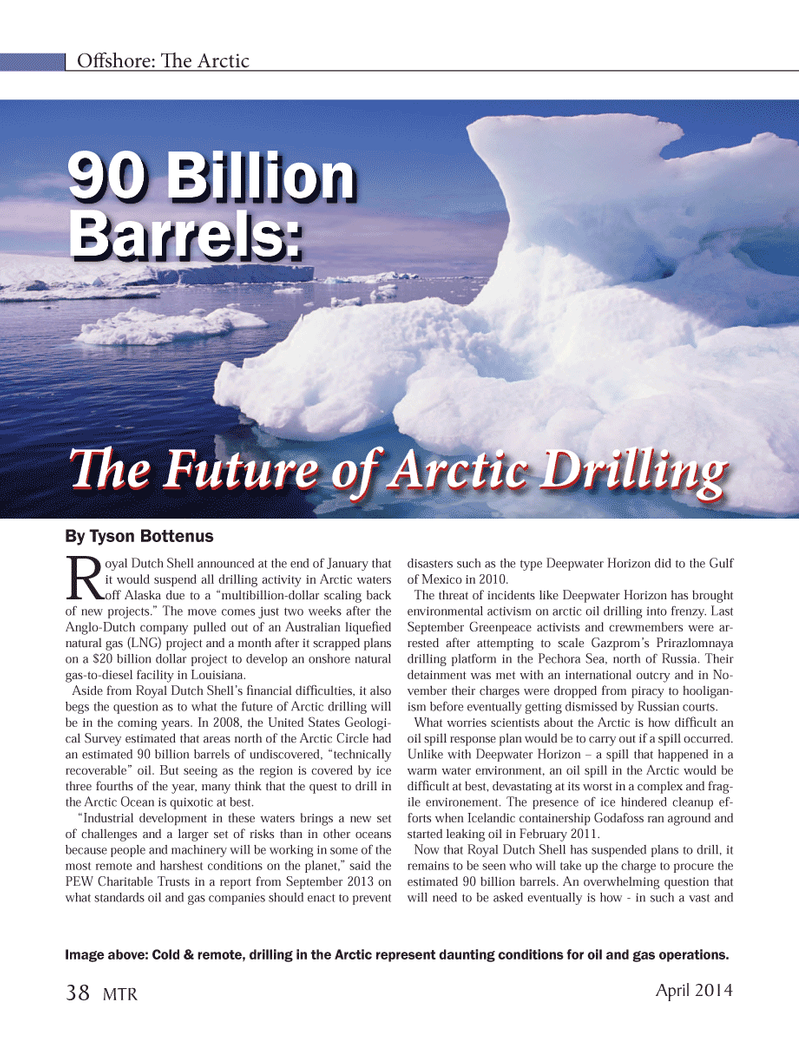
Page 38: of Marine Technology Magazine (April 2014)
Offshore Energy
Read this page in Pdf, Flash or Html5 edition of April 2014 Marine Technology Magazine
Off shore: Th e Arctic
R oyal Dutch Shell announced at the end of January that it would suspend all drilling activity in Arctic waters off Alaska due to a “multibillion-dollar scaling back of new projects.” The move comes just two weeks after the
Anglo-Dutch company pulled out of an Australian liquefi ed natural gas (LNG) project and a month after it scrapped plans on a $20 billion dollar project to develop an onshore natural gas-to-diesel facility in Louisiana.
Aside from Royal Dutch Shell’s fi nancial diffi culties, it also begs the question as to what the future of Arctic drilling will be in the coming years. In 2008, the United States Geologi- cal Survey estimated that areas north of the Arctic Circle had an estimated 90 billion barrels of undiscovered, “technically recoverable” oil. But seeing as the region is covered by ice three fourths of the year, many think that the quest to drill in the Arctic Ocean is quixotic at best. “Industrial development in these waters brings a new set of challenges and a larger set of risks than in other oceans because people and machinery will be working in some of the most remote and harshest conditions on the planet,” said the
PEW Charitable Trusts in a report from September 2013 on what standards oil and gas companies should enact to prevent disasters such as the type Deepwater Horizon did to the Gulf of Mexico in 2010.
The threat of incidents like Deepwater Horizon has brought environmental activism on arctic oil drilling into frenzy. Last
September Greenpeace activists and crewmembers were ar- rested after attempting to scale Gazprom’s Prirazlomnaya drilling platform in the Pechora Sea, north of Russia. Their detainment was met with an international outcry and in No- vember their charges were dropped from piracy to hooligan- ism before eventually getting dismissed by Russian courts.
What worries scientists about the Arctic is how diffi cult an oil spill response plan would be to carry out if a spill occurred.
Unlike with Deepwater Horizon – a spill that happened in a warm water environment, an oil spill in the Arctic would be diffi cult at best, devastating at its worst in a complex and frag- ile environement. The presence of ice hindered cleanup ef- forts when Icelandic containership Godafoss ran aground and started leaking oil in February 2011.
Now that Royal Dutch Shell has suspended plans to drill, it remains to be seen who will take up the charge to procure the estimated 90 billion barrels. An overwhelming question that will need to be asked eventually is how - in such a vast and
Image above: Cold & remote, drilling in the Arctic represent daunting conditions for oil and gas operations. 90 Billion
Barrels: 90 Billion
Barrels:
Th e Future of Arctic Drillingture of A tic D illin
By Tyson Bottenus
April 2014 38 MTR
MTR #3 (34-49).indd 38 4/9/2014 10:54:30 AM

 37
37

 39
39
